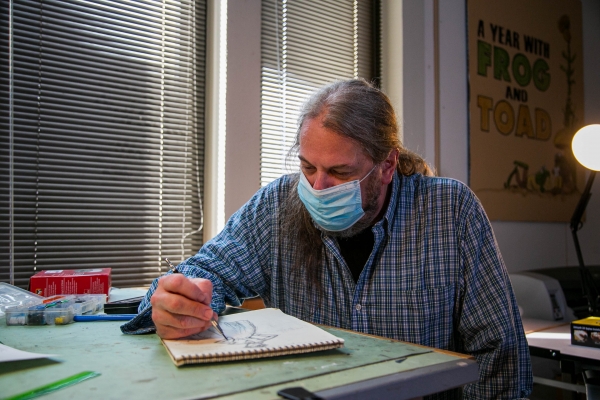MFA in Theatre, Creative Writing continue to thrive, grow together

COLUMBUS, Miss.– David Carter was positioned perfectly to see the model.
Charged with implementing a theatre education program at Mississippi University for Women, Carter needed only to look at The W’s low-residency MFA in Creative Writing. He saw that program met the needs of students in Mississippi and the surrounding area and allowed them to keep their jobs or to stay near family to take care of other obligations while pursuing their degree.
Carter’s vision ultimately led to the creation of a low-residency MFA in Theatre Education that is the first of its kind in the United States. The three-year program (64 credit hours) took about three years to be approved, but it is thriving moving into its third year and the start of the 2021-22 school year.
“The mission statement of the Mississippi University for Women promises ‘a personalized learning environment in all of its educational programs,’” said Carter, who is the chair of The W’s Department of Theatre. “The adaptability of this program to the needs of the K-12 teacher fits well into this mission. The small class size and face-to-face interaction offered to each student fulfills the promise of a quality education in a learning-friendly environment.”The W is on track to have more than 40 students from more than 15 states for the fall semester. That total exceeds the original goal to have 12-15 students by the third year. Public school and college-level teachers as well as theatre professionals will be among the students enrolled in the program in the fall. Carter said the Department of Theatre was able to attract that number of students without spending any money on advertising.
Dr. Brian Anderson, dean of The W’s College of Arts & Sciences, said he was proud to see the program offer its first in-person residency on campus this summer. He said COVID-19 forced the inaugural residency last year to be held online.
As dean, Anderson has played an integral role in the launch of the MFA in Theatre Education and the MFA in Creative Writing. He said both programs fill a distinct need in the region and beyond.
“The MFA-CW program’s selling point is its low residency format,” Anderson said. “It appeals to people who don’t wish to leave their jobs and move from their homes, providing online coursework interspersed with residency periods in the fall (coinciding with the Welty Symposium) and the summer. Flexibility is why enrollment is well over 30 now and the department was able to add two tenure-track assistant professors to the faculty this fall.
“The MFA-TE program has a robust enrollment in its first two cohorts, which is a good sign that it will grow even more.”
Anderson said the MFA-TE program is even more attractive to students because theatre teachers here (and beyond) can ramp up to an AAAA teacher license with a terminal degree.
Dr. Kendall Dunkelberg said The W’s MFA-CW program is different from most traditional MFA programs in that it offers drama in addition to poetry, fiction and creative nonfiction. He said writing classes in playwriting and literature classes in drama allow it to be an excellent partner to the low-residency MFA-TE program.
“Many of their students take drama and literature classes offered by our program, and our drama students will be able to take practical classes in theatre like acting and directing or design and production,” Dunkelberg said. “We’re pleased to work with these students in our creative writing classes, and pleased to offer our playwrights the opportunity to gain more practical experience in the theatre. We also hope that as the Theatre Education MFA program continues, we will have more opportunities to have our students’ scripts featured at their summer residency or produced by the theatre department.”
Assistant professor Kris Lee, who is teaching playwriting and drama classes, has taught in the MFA-CW program since the beginning, he said a collaboration between The W’s two MFA programs is a model for the highest success.
“You’re basically putting quality writers in classrooms with quality teachers,” Lee said. “From my experience leading those courses where this is what happens, I often end up learning just as much as they do. There’s a patience that comes from these separate practices that marries well together. It’s a win-win situation.”
That’s the model Carter envisioned when he set out to create a quality program in a learning-friendly environment. He said he is eager to see both programs continue to collaborate and grow together to serve The W’s mission.
“When we first envisioned this course of study, we pictured a small program that could be beneficial to some state and local public-school teachers while promoting our department statewide,” Carter said. “This has exceeded our wildest expectations, and it is truly gratifying to see it become so successful. I am honored to be associated with such unique and effective programs as can be found in Theatre Education and Creative Writing.”